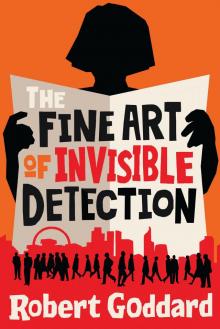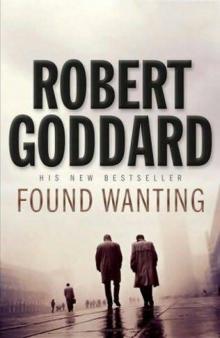- Home
- Robert Goddard
Blood Count Page 7
Blood Count Read online
Page 7
‘Have you seen your son since?’
‘No. I’ve no idea where he is. Gazi put him somewhere out of my reach – out of everyone’s reach. Ingrid may know, of course. It could be that’s partly what the money’s needed for: to look after him. That could also be why Marco’s refusing to cooperate, because once, ever so briefly, he thought Monir was his son.’
‘But you think he knows where the boy is?’
‘He must do. He set it all up for Gazi in the first place, so … there’s a chance, if I can persuade him to …’ She put a hand to her forehead. ‘When I heard they’d caught Gazi, I thought I might be able to … get through to him. But he refuses to see me.’ She sighed. ‘He can’t avoid seeing me in court, of course. Sitting there, day after day, looking at him, is the only way I can appeal to his conscience.’
‘Does he have a conscience?’
‘Probably not.’ Her head fell. ‘No. Of course he doesn’t. I’m fooling myself.’ She shivered. ‘And I’m cold. Can we move, please?’
They left the bench and walked on. Hammond felt immensely sorry for this sad and lonely woman. She knew her stubborn vigil in the court was almost certainly in vain. But what else could she do to win back the child Gazi had stolen from her?
‘I expect it’s occurred to you, Edward, that Monir was too young when we were parted for him to remember me now.’
‘That wouldn’t stop him wanting to know you.’
‘Perhaps not. But first I would have to convince him I am his mother. Whatever Gazi has told him, or instructed others to tell him, it wouldn’t have been the truth. I have accepted that. I know it will be hard … for both of us. But still … I have to try. It took me more than a year to … function again … after I lost Monir. By then Milošević had been sent here to stand trial and there was a democratic government in Serbia. I tried to … adjust to life without my son. I was ashamed of many of the things I’d done during the bad times. There were people who knew I’d been Gazi’s mistress. They’d look at me in the street, or maybe I just imagined them looking … I decided I had to leave Belgrade – leave Serbia. I applied to work for the Bosniak Commission on Missing Persons. They took me on because of my proficiency in English. So, I moved to Sarajevo. I never told anyone I was Serbian. They all thought I was from Slovenia. It was only in Sarajevo that I began to learn just how much … pure evil … the war had involved. So many killings … and other things … you wouldn’t believe. And so many missing. Dead, of course, most of them, piled up, one on top of the other, in caves and pits and holes dug in fields. But their relatives were still looking for them, looking for a body to bury, looking for the truth about what had happened to them: where and when and how they’d died. Not why, though. That bit they understood. The war turned neighbours into enemies. It tore everything apart. They weren’t trying to put it back together the way it was, you see. That’s impossible. They just wanted to know. In the end, that’s better than not knowing. That’s why finding Monir, even if he … rejects me … would be better than never finding him at all.’
‘And Marco’s your best chance of doing that?’
‘Right now, yes. Do you have any idea where he’s gone?’
‘Not really. Except … well, a few days before he disappeared, he received a package in the post from Italy.’ Hammond went on to recount the story of the classified ad in La Gazzetta dello Sport. ‘Whoever sent it obviously knew where he was living, so …’
‘He may know where he’s gone.’
‘Yes. But I haven’t a clue who the sender was. Did Marco talk much about his friends or family back home?’
‘Never. I was at his flat a few times when his mother phoned. She’d do most of the talking, I remember. When I asked him about her, he clammed up. “The less you know about me,” he’d say, “the safer you are.” I think now he meant the safer he was.’
‘Which part of Italy is he from?’
‘I don’t know. The north, I think. But that’s more of a … feeling … than anything else. Because of his … coolness. He was always very self-controlled.’ She smiled faintly. ‘Except when he watched football.’
‘He went to matches?’
‘No. I mean watched. On television – some Italian satellite channel. He’d drink beer and shout at the referee. I used to laugh at him when he did that.’
‘Did he have a favourite team?’
‘Probably. But they were all the same to me. He used to wear a special football shirt when he watched, I remember. Black with red stripes.’
‘That might mean something to me if I knew anything about football.’
‘But you don’t?’
‘No. On the other hand …’ A hopeful thought came to Hammond. ‘I know someone who does.’
He took out his phone and switched it on, confronting as he did so the unwelcome fact that he had several messages waiting. He ignored them and dialled Peter and Julie’s number.
They were lunching with Sophie somewhere near a ski run Peter described as ‘sumptuous’. Hammond slogged through some conversational heavy weather concerning his regrettable absence before coming to the point. To resolve an argument for a colleague, could Peter the walking (and ski-ing) encyclopaedia on all matters football-related tell him which Italian team played in black-and-red-striped shirts?
‘AC Milan, Edward. Doesn’t everyone know that? Now, does this sudden thirst for trivia mean you’re free to join us after all?’
No. It did not mean that. After running repairs to his cover story and with profuse expressions of gratitude, Hammond rang off. ‘It looks like Marco’s from Milan,’ he announced. ‘A northerner, like you said, although—’
He stopped. Zineta seemed barely to have heard him. She had walked on a little way and was staring into space, her brow furrowed pensively.
‘Zineta?’
She started and looked round at him. ‘I’m sorry, Edward,’ she said, smiling apologetically. ‘I was … remembering.’
‘What were you remembering?’
‘Something I’d forgotten … until now. After watching his football matches, Marco often used to phone a friend in Italy called Guido and joke with him about the result. He could be the man who sent him the newspaper.’
‘Yes. He could. Unfortunately, there are a lot of Guidos in Milan.’
‘Milan?’
‘Where the black-and-red-shirts play.’
‘Ah.’ She nodded. ‘So, we need to find a man called Guido in an Italian city of more, I guess, than a million people.’ She shook her head dolefully. ‘Nemoguć.’ It was the first word of Serbian he had heard her speak. And he did not need her to supply a translation.
They retreated to a café in the ornate Passage Arcade. There Hammond explained what he saw as their only recourse. It meant admitting to Ingrid that he had let Piravani slip through his fingers. But he would have to admit that sooner or later anyway. And there was surely a good chance Gazi would have passed on to her whatever information he had about Piravani’s background.
‘You won’t mention me to her, will you, Edward?’ Zineta grabbed his arm for emphasis and was clearly deeply disturbed by the possibility. ‘I don’t want her to know I’m helping you.’
‘Don’t worry. I’ll claim to have got this far on my own.’
He stepped out into the arcade and rang Ingrid’s number. He was obliged, as before, to leave a message. Then he checked his own messages, beginning with a text from Alice sent the day before. ‘Unc Bill trying 2 contact u. Wots he got nickers in twist about?’ He texted back. ‘Will speak 2 Bill. Nothing 2 worry about.’ There were a couple of voicemails, one of which he assumed was from Bill, perhaps explaining why he had been bothering Alice. But they would have to wait. Ingrid was calling back.
‘Where have you been and what have you been doing, doctor? You have only three days left.’
Hammond had drawn some meagre consolation from the calculation that technically he had more like six days, since Gazi could say nothing against him in court u
ntil after the weekend, but he did not propose to point that out to Ingrid. ‘I’ve run into some problems.’
‘I don’t want to hear about problems. I want to hear about the money.’
‘I’m going to have to deal with the Accountant through an intermediary: a friend of his in Milan.’
‘What friend?’
‘I’m hoping you can tell me who he is.’
‘You don’t know?’
‘Listen to me, Ingrid. Your best chance of getting the money is to help me. What did Pira—’
‘Don’t say his name.’
‘OK, OK. The Accountant. What did he do before your father hired him?’
‘Same thing. For more people.’
‘On his own?’
‘No. He had a partner. But my father wanted … an exclusive service. So, they split.’
‘Name of the partner?’
‘I don’t know. Maybe my father knows. I would have to ask him.’
‘Well, ask him, then. I need to know.’
‘I cannot speak to him until this evening. Right now, he will be in court.’
‘Make it as soon as you can.’
‘You told me you had met with the Accountant.’
‘I have.’
‘So, why the question about his ex-partner?’
‘Because the Accountant’s gone to ground again.’
‘You’ve lost him, haven’t you?’ she snapped. ‘How could you be so … estúpido?’
‘Do you want me to go on with this, Ingrid?’ He nerved himself to call her bluff. ‘Or would you rather do it yourself?’
There was a pause. When Ingrid spoke again, he knew at once from the deeper, more restrained tone of her voice that he had won the skirmish. But a skirmish was all it was. There was still a battle to be fought. ‘I will call you as soon as I have the information.’
‘Thank you.’
‘But, doctor …’
‘Yes?’
‘Make no more mistakes. For your own sake.’
NINE
Bill Dowler was six years older than his sister Kate, but to Edward Hammond the difference had always seemed greater, more like ten or twelve. There was a slight facial resemblance, slighter than ever since Bill had grown a beard, but their personalities could hardly have been more different: he calm and stoical, she vibrant and demonstrative. After thirty years in the Army, Bill had moved to a cottage in the New Forest, where he pursued a solitary life as a jobbing gardener and required, so he declared, nothing of the outside world, its failure to operate on military principles of order and discipline an abiding disappointment to him.
There was a simplistic, visceral side to Bill which Hammond sometimes found amusing, sometimes objectionable and sometimes refreshingly direct. He had taken seriously his role of elder brother to a sister who, in his opinion, seldom knew what was best for her, to the extent that Hammond was never quite sure Kate had been joking when she said, prior to his first meeting with Bill, ‘If he doesn’t approve of you, I expect they’ll find your body in a ditch.’
That first meeting had featured an argument about the merits of the Falklands War, a conflict in which Bill had seen hand-to-hand action, so Hammond might reasonably have supposed their relationship had started badly. But not so. Kate later told him Bill had liked and respected him from the first. ‘Apparently, he thinks you’re just the stabilizing influence I need.’
If Hammond had truly been a stabilizing influence, of course, Kate would not have thrown their marriage into the mincer after twelve years and taken up with Alan Kendall. Bill’s faith in him turned out to be sadly misplaced. To his credit, Bill never even hinted that he blamed Hammond for the break-up. But at the funeral he made his feelings very clear on one subject. ‘If I ever find out who killed her, I swear I’ll make sure he doesn’t live to see the inside of a courtroom, far less a cell with all mod cons in some bloody holiday-camp prison.’
It was pure Bill. And he meant it. The knowledge lurked darkly at the back of Hammond’s thoughts as he sat in his room at the Kurhaus Hotel that evening, receiver to his ear, listening as the telephone rang at the other end of the line in a New Forest cottage. He rather hoped Bill was not in. It would be easier to lie to an answerphone. But in the very instant the machine cut in, Bill picked up.
‘Hello?’
‘Hi, Bill. It’s Edward.’
‘At last. I was about to send out a search party.’
‘Sorry I didn’t respond to your message right away. I’ve been busy.’
‘So Alice said. Ski-ing cancelled, apparently.’
‘Yes. I was surprised you’d been on to her, actually.’
‘I didn’t have your mobile number. And since you never seemed to be home …’
‘You didn’t tell her why you were anxious to contact me, did you?’
‘Of course not. What do you take me for?’
‘I just don’t want her to get the idea something’s going on when in fact nothing is.’
‘Point taken. And that’s right, is it? Nothing’s going on?’
‘Don’t you think I’d tell you if there was?’
‘I’m not absolutely sure, Edward. Would you?’
‘Of course.’
‘I spoke to your PA yesterday. She’s very good. Any politician would envy her ability to avoid answering a direct question like “Where is Dr Hammond?”’
‘Well, sometimes she … overdoes the stonewalling.’
‘I got the distinct impression she didn’t exactly know, you see. Where you are, I mean.’
Hammond swore silently. ‘Why did you phone her, Bill?’
‘Because you didn’t get back to me. So, how about it? Where are you?’
The truth, on that point at least, seemed the safest option. ‘The Hague.’
‘What’s taken you there?’
‘I can’t go into it. I’m bound by … doctor–patient confidentiality.’ It was a miserable excuse, but he did not have a better one to offer. ‘I can assure you, though, this trip has nothing to do with Kate. Kendall’s fantasizing. Don’t let him get to you.’
‘I can deal with Kendall. That’s not—’
‘Hold on.’ Hammond’s mobile was chirruping. Glancing at the display, he saw the caller was Ingrid. ‘I’m sorry, Bill. I’m going to have to cut you off. Something’s cropped up this end.’
‘Just a—’
‘Sorry.’ He put the phone down and grabbed his mobile. ‘Hello?’
‘I have the information you requested, doctor.’ Ingrid sounded cooler and more collected than earlier in the day. Perhaps Gazi had reminded her of their priorities.
‘Good.’
‘Are you close to a land line?’
‘Yes. Why?’
‘Call the number I’m about to give you on that. It’s a land line also. We need to take precautions.’
‘If you say so.’
‘I do.’
What worried Hammond during the switch of phones was that such precautions might actually be necessary. He did not know the sort of people who were on Ingrid’s tail, but he was sure he did not want them on his.
Ingrid picked up the phone after the first ring. ‘Doctor?’
‘Yes. What have you got for me?’
‘My father says the Accountant’s partner was Guido Felltrini.’
‘Guido Felltrini?’
‘Yes.’
‘Excellent. He’s the man I’m looking for.’
‘I have their business address in Milano from 1992. You understand Felltrini could have moved offices since then?’
‘Of course.’ But probably only to another city-centre location. It should be possible to find this man, it really should. ‘Go ahead.’
‘Via Ragno seventeen, second floor.’
‘Got it.’
‘Are you going there?’
‘I am.’
‘Be careful.’
‘Worried about me, Ingrid?’
‘Yes, doctor. I am worried you will fail.’
/> That afternoon, he had promised to take Zineta with him to Milan. Her motive for finding Piravani troubled him. At some point, it could easily conflict with his own. Yet a promise was a promise. He had little that was creditable to show for his involvement with Gazi. Helping Zineta discover what had become of her son might at least make him feel better about himself. He picked up the phone and dialled the mobile number she had given him.
‘Zdravo.’
‘Zineta, this is Edward Hammond.’
‘Ah. You actually called. I thought … you might not.’

 The Fine Art of Invisible Detection
The Fine Art of Invisible Detection One False Move
One False Move Panic Room
Panic Room Beyond Recall
Beyond Recall Out of the Sun
Out of the Sun In Pale Battalions - Retail
In Pale Battalions - Retail Painting The Darkness - Retail
Painting The Darkness - Retail The Corners of the Globe
The Corners of the Globe Name To a Face
Name To a Face Closed Circle
Closed Circle Caught In the Light
Caught In the Light Into the Blue
Into the Blue Past Caring - Retail
Past Caring - Retail Past Caring
Past Caring Hand In Glove - Retail
Hand In Glove - Retail Borrowed Time
Borrowed Time Days Without Number
Days Without Number James Maxted 03 The Ends of the Earth
James Maxted 03 The Ends of the Earth Fault Line - Retail
Fault Line - Retail Play to the End
Play to the End Sea Change
Sea Change Never Go Back
Never Go Back Take No Farewell - Retail
Take No Farewell - Retail Blood Count
Blood Count Found Wanting
Found Wanting Sight Unseen
Sight Unseen Hand in Glove
Hand in Glove The Ways of the World
The Ways of the World